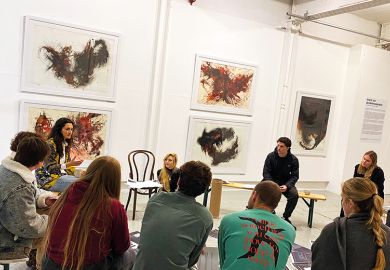Source: Report Digital
Drone warfare: in the battle to impart knowledge, some academics rate the effectiveness of their lecturing skills more highly than their students do, research indicates
When European metal plate printing was developed in the mid-15th century, a number of contemporary observers thought that it signalled the end of the lecture. It no longer made sense, they argued, to stand up in public and read out your notes if anyone could read the original text for themselves.
Fast forward 500 years to the 1960s expansion of UK universities and the onset of a mass higher education system and you would have found wall-to-wall lectures in almost every institution. Although there are universities today in the Netherlands, Denmark and Germany that do not rely on lectures, most UK institutions still do.
Both the current “rationalising” of curriculum provision and institutions’ efforts to improve Key Information Set data about the proportion of students’ time spent in class are serving to increase class sizes and the pressure to use lectures. But in terms of pedagogic effectiveness, is this sensible?
By the 1970s, educational scholar Donald Bligh had written one of the first comprehensive reviews of the research evidence about teaching in higher education, a book titled What’s the Use of Lectures? It was comprehensively damning. Although there are a number of pedagogic systems that almost every research study has found to be more effective than the conventional alternatives, for the lecture-based approach the reverse is true.
More than 700 studies have confirmed that lectures are less effective than a wide range of methods for achieving almost every educational goal you can think of. Even for the straightforward objective of transmitting factual information, they are no better than a host of alternatives, including private reading. Moreover, lectures inspire students less than other methods, and lead to less study afterwards.
For some educational goals, no alternative has ever been discovered that is less effective than lecturing, including, in some cases, no teaching at all. Studies of the quality of student attention, the comprehensiveness of student notes and the level of intellectual engagement during lectures all point to the inescapable conclusion that they are not a rational choice of teaching method in most circumstances.
Unforgettable…or were they?
I have had the pleasure of experiencing lecturers whom I remember vividly – although I remember what they said less clearly. There are certainly teachers who are capable of bucking the trend and achieving better results than the research evidence suggests – but also, of course, others whose effectiveness is even worse than the averaged data in published findings. Interestingly, lecturers who are rated poorly by their students assess their own effectiveness much more highly – so there is a degree of self-delusion here.
But is the evidence true for all types of lecture? Bligh, and the research he summarised, had a fairly narrow conception of the range of things that lectures are used for. In some disciplines they perform the role of demonstrating the use of the discourse of the discipline: for example, the way legal arguments are constructed, how literature is critiqued and so on. The research on lecturing has not addressed this issue well (although conventional wisdom about how students learn to use disciplinary discourse emphasises active engagement rather than passive observation).
Other aspects of the lecture have been poorly researched. Diagrams, images, video and animation can be displayed during lectures much more easily (and with more impact) than was possible when most of the research was undertaken. Lectures are much more visually interesting nowadays.
One of the limitations of studies in this area is that they usually consider lectures in isolation and compare them with other methods, also in isolation. In practice, lectures are only one component of a pedagogic system that includes study, assignments, exams and other classes. Lectures can provide a conceptual framework for such a system, pace students through it, identify what needs to be studied, provide a social context for otherwise solitary study and so on.
It is much harder to research the way lectures fulfil multiple and subtle roles in complex pedagogic patterns. However, what we know about the alarmingly low levels of student effort in UK higher education is that current lecture-based pedagogic systems are, overall, not doing very well.
Not all “lectures” involve 50 minutes of uninterrupted presentation. Student attention can be maintained, and the level of intellectual engagement increased, by breaking lectures up and introducing brief active interludes, such as quizzes. Some teachers turn lecture slots on the timetable into large class workshops.
Addressing weaknesses
Lectures can also be used to brief and debrief active learning that takes place out of class, rather than assuming that such study will happen automatically as the consequence of the presentations.
The online training materials I wrote for the company Epigeum demonstrate not only how to lecture, but also how to do other things that ameliorate the format’s inherent weaknesses. The term “lecture” is often a misnomer for what actually goes on.
It may be argued that lectures are used not because they are believed to be effective, but because they are cost-effective: they are so cheap that it does not matter if they are a bit less effectual than unaffordable alternatives.
As learning gains are predicted by study hours, not by class hours, this argument would hold up only if lectures were good at increasing the former and they are not: indeed, the more lectures there are, the fewer learning hours each generates.
There are alternatives to lecturing that have a much better record of generating learning hours, and some cost nothing. The only potential problem is that they may require more effort from students.




